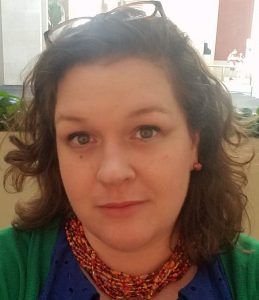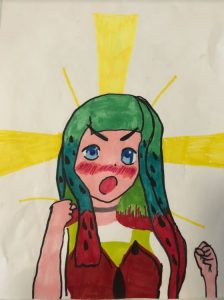I went home after spending two whole days at preschool for the week. When I walked into the house, I stopped in the doorway and stared at my mom. She turned around from the kitchen and asked what’s wrong. I looked at her with eyebrows furrowed, dropped all my things wearily, and said, “Mommy, I need to be alone”
My mom smiled and said I could be, understanding that children, real children, were beings that came straight from Hell.
Since my parents understand what it’s like being introverted, especially at my age, I never thought of it as a bad thing. It wasn’t until I reached middle school I realized that introversion is, according to stuck-up idiots of society, seen as a negative thing. Apparently, they think that wanting to be alone for at least fifteen minutes and not befriending everyone that’s in a five-to ten-mile radius are the two major signs of an extreme antisocial disorder.
One of my best friends happens to be one of these idiots and confronted someone in our class about his said “disorder.” She kept going on and on about how he needs to stop being antisocial, depressed, and negative. I cut in and told her she could just ask why he’s an introvert. She looked at me with pure disgust and said, “Yeah. Exactly.”
I remember giving her a look of disgust back, and I may have been thinking something along the lines of, Ya big-mouthed socialite. I’m an introvert.
Being that people thought that being an extrovert was the greatest thing in the world, I decided to see what’s just so great about it. And before I tell you about my first experience, let me say there’s ABSOLUTELY NOTHING SO FAN-FRIGGIN-TASTIC ABOUT IT. Anyways…
After standing in the lunch line and paying, I sat down at my table and started eating. It was nice outside, where my real friends were hanging out, but all the talkative people at our table were sitting inside. And being that extroverts just have to know everyone in existence, I decided to force myself to sit with the people I kinda know.
For a couple minutes, I told myself to jump into a conversation that involves me or to just start one. When I finally thought of a topic to talk about, I sat up and opened my mouth until a cursed extrovert sat down, said my name in a stupid, high-pitched and cheery voice, and started loudly conversing with others.
I looked outside and yearned to be with my fellow introverts. At the same time I didn’t want to be rude, so I desperately stared off into the distance, praying that the right moment to leave would soon come.
And it did.
When Stupid, High-Pitched and Cheery Voice sat down, she sighed, rolled her eyes, and said, “I need a fork. Lisa can you come up and get one with me?”
Once she left, I quickly grabbed my things and went outside. When I saw my group of my friends, I shouted, “I can’t do it!”
A week passed, and I didn’t try my experiment again. I weighed out some of my options, and here were my answers: there’s no way I’ll try talking to people at lunch again, and there’s no chance I’ll ever play along with the incoherent babble that occurs on the bus.
Though after I made that conclusion, I got a text from one of my friends from my old school, asking if I would be coming to their prom.
“Force me to be social and talkative and nice to the others,” I reminded my friend when we pulled up to the banquet hall.
“Will do.”
As I walked into the lobby, I was greeted with fanatic screams (okay, maybe just two), surprised yet (slightly? somewhat?) happy faces, and hugs. A lot of people were saying they didn’t know I was coming and how beautiful I looked and so on and so on.
After getting away from spending a whole two to three minutes with my adoring fans, we walked into the room the dance was being held and sat down at an almost empty table. My two friends were listening to me gabbing away about my new school and how much I loved it while the three people we were sharing a table with got up and moved, once again hindering me from going through with the experiment.
However, throughout the night, I was surprised to see how outgoing I was, dancing for over an hour, catching up with people I didn’t even know would’ve missed me. People who were new to the school that I’ve never met knew who I was.
Even after that, I didn’t see why being an extrovert was so great, and I spent the next two days in solitude. To me, you just put yourself in situations where everyone wants you to come to their social event and will be eternally upset if you say no. Meanwhile, introverts have it good. Unless they’re invited to a party from one of their close friends, then they’ll either A: won’t hurt the host’s feelings if they say they had other plans (and those plans were curling up with a book, laptop, or furry animal and watching Netflix) or B: not get invited at all which would only make them happy. You know why? Because it’s one less person an extrovert has to worry about.
Around Christmas time, I went shopping with my friend (the same friend who called us introverts all those nasty names, mind you), and our first stop was Macy’s. There, she was looking for gifts to give each of her friends in their Secret Santa game (but if everyone’s getting everyone a gift, how is it a secret?). I was told it’d be a little, short trip there, then we’d go to Target, which was where I needed to go.
Well, a short trip to my friend and her mom means an hour and a half to two and half hours all because my friend couldn’t find good gifts. She found a couple things they’d like, but she was nervous they wouldn’t really like it.
Let me just interrupt my own story really quick: so, if you can’t quickly find at least one gift for each of your friends that you’d know they’d like, then do you really know them enough to call them your friend? Yeah, just further proves my point on introversion.
“I have too many friends,” she finally admitted.
I stopped walking and stared at her. This girl had to be friends with every single person in her school ever since Kindergarten, and she’s just now admitting she has too many friends?
“I don’t even know what they really like all that well, and I have to buy gifts for every single one of them. Why do I have to be so social?”
“I’ve been telling you all these years that you should be like me,” which was my verbal way of my thoughts being, Yeah, having eight plus “best” friends is a pain in the ass.
Maybe I’ll try this experiment again, but I doubt that I’ll ever convince myself that being an introvert is a bad thing. You know why? Because it isn’t, and you can be feared by most and loved by few which, to me, is a great gift, especially during the holidays.
Erin Brody is a writer from the Pittsburgh area who attends Lincoln Park Performing Arts Charter school for their Writing and Publishing program. She has been published in pulp. for creative nonfiction, Hot Dish Magazine for short fiction, Dime Show Review for poetry, and she will soon be featured in Variant Literature for creative nonfiction. She is also the managing editor of The SIREN newspaper and could often be found watching or participating in theatre.


 Trish Rodriguez is the Fiction Editor and Fiction Contest Coordinator at Philadelphia Stories. She is also a senior prose editor at Typehouse Literary Magazine and the former managing editor of Rathalla Review. A graduate of Rosemont College’s MFA Program in Creative Writing, she is a writer herself, focusing mostly on short fiction.
Trish Rodriguez is the Fiction Editor and Fiction Contest Coordinator at Philadelphia Stories. She is also a senior prose editor at Typehouse Literary Magazine and the former managing editor of Rathalla Review. A graduate of Rosemont College’s MFA Program in Creative Writing, she is a writer herself, focusing mostly on short fiction. Aimee LaBrie’s short story collection, Wonderful Girl, was chosen as the Katherine Anne Porter Prize in Fiction and published by the University of North Texas Press. Her short stories have been nominated for several Pushcart Prizes and her work has appeared in StoryQuarterly, Pleiades, Beloit Fiction Journal, Cleaver Magazine, Iron Horse Literary Review, The Minnesota Review, Permafrost, and other literary journals. In 2012, she won first place in Zoetrope’s All-Story Fiction contest. Aimee lives in Princeton, NJ and teaches creative writing for Writers House at Rutgers University, New Brunswick.
Aimee LaBrie’s short story collection, Wonderful Girl, was chosen as the Katherine Anne Porter Prize in Fiction and published by the University of North Texas Press. Her short stories have been nominated for several Pushcart Prizes and her work has appeared in StoryQuarterly, Pleiades, Beloit Fiction Journal, Cleaver Magazine, Iron Horse Literary Review, The Minnesota Review, Permafrost, and other literary journals. In 2012, she won first place in Zoetrope’s All-Story Fiction contest. Aimee lives in Princeton, NJ and teaches creative writing for Writers House at Rutgers University, New Brunswick. Susette Brooks
Susette Brooks Debra Fox is an adoption attorney and founder of Story Tributes, an enterprise that preserves the stories of people’s lives. She is a reader for Philadelphia Stories, as well as the mother of two sons: one profoundly autistic and the other a journalist. In her spare time she loves to dance. She lives on the outskirts of Philadelphia with her family. Much of her published work can be found at
Debra Fox is an adoption attorney and founder of Story Tributes, an enterprise that preserves the stories of people’s lives. She is a reader for Philadelphia Stories, as well as the mother of two sons: one profoundly autistic and the other a journalist. In her spare time she loves to dance. She lives on the outskirts of Philadelphia with her family. Much of her published work can be found at 
